3 - Timor-Leste and Indonesia
Judicial Incapacity and the Politics of Reconciliation
Published online by Cambridge University Press: 04 March 2021
Summary
This chapter examines the case of Timor-Leste, the first peace settlement negotiated after the United Nations launched its anti-amnesty policy. As a UN-led process, initial acceptance of the anti-amnesty position was guaranteed: none of the resolutions that provided for the settlement of East Timor’s independence struggle included amnesties, and soon after independence a hybrid tribunal was established to prosecute perpetrators of human rights violations. However, this anti-impunity/pro-accountability stance quickly eroded in the post-conflict period with persistent calls for amnesties being translated into practical impunity measures. As this chapter demonstrates, both Indonesian and East Timorese leaders have emphasised the importance of state security, stability, and survival in justifying the use of impunity measures. For Indonesian, in particular, acceptance of impunity for human rights violations came in the context of the threat to state disintegration posed by separatist claims in other parts of the country. For both, resistance to the anti-amnesty norm was the result of a norm hierarchy that prioritises the survival of the state over individual human rights claims.
- Type
- Chapter
- Information
- Negotiating PeaceAmnesties, Justice and Human Rights, pp. 100 - 124Publisher: Cambridge University PressPrint publication year: 2021



